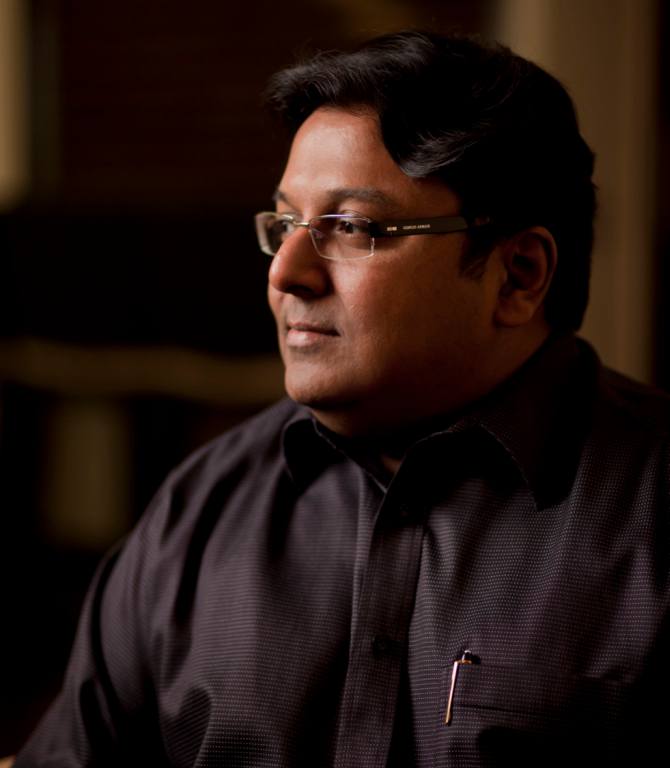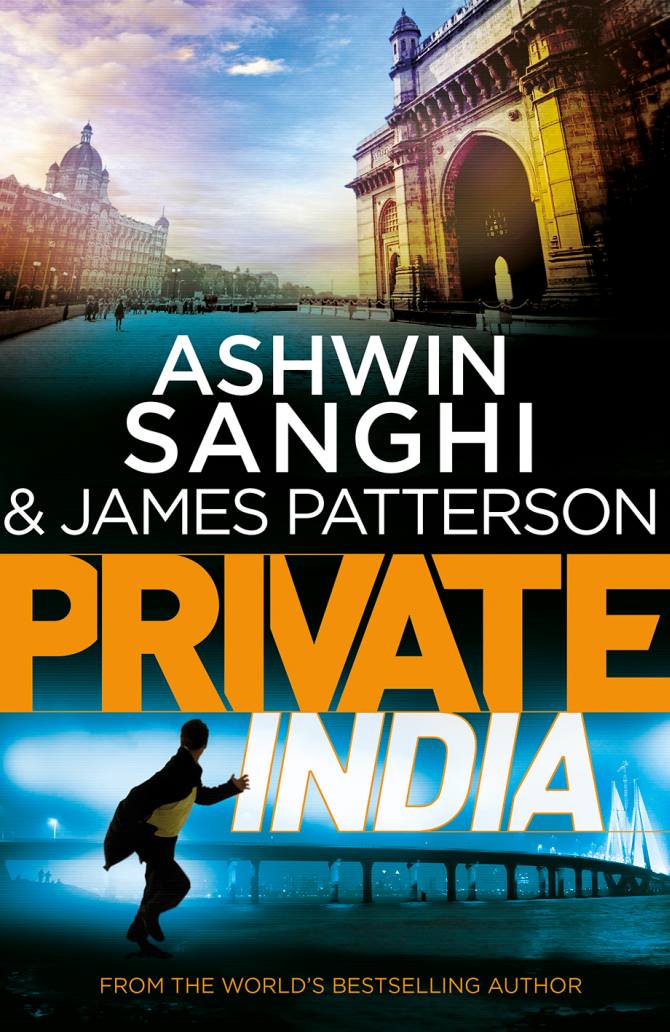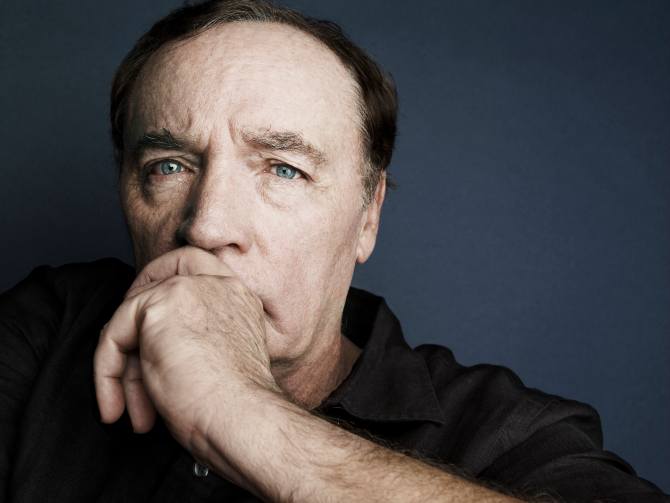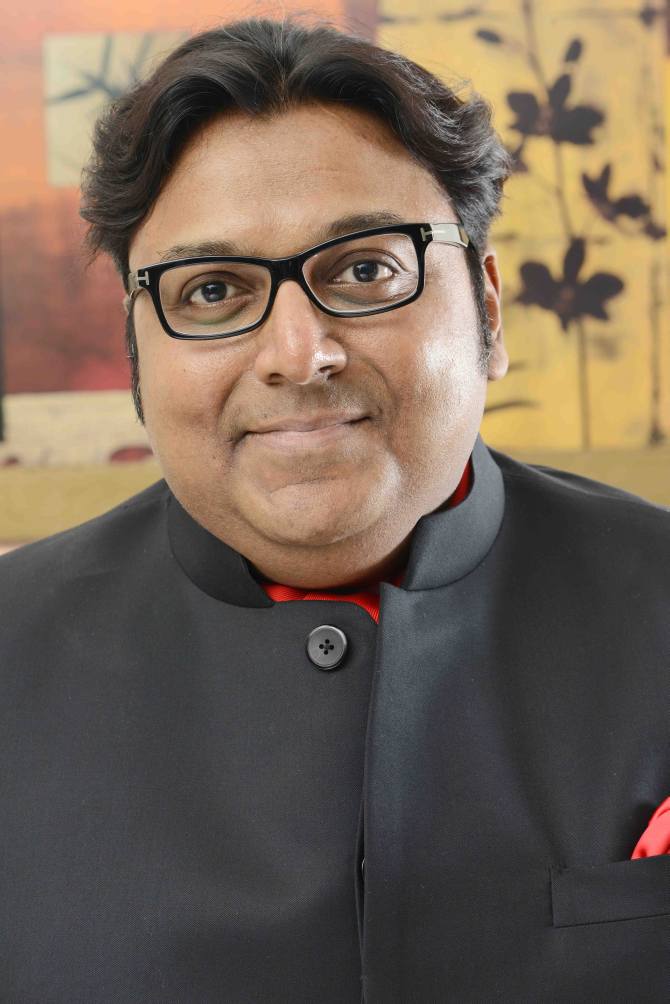
Says who? Ashwin Sanghi, the author who has been hailed as India’s Dan Brown and called the master of historical noir.
His three bestselling novels -- The Rozabal Line, Chanakya’s Chant and Krishna Key -- mythological thrillers set in India were absolute page-turners.
Riding high on the success of his past endeavours, comes Private India, his first collaborative novel co-written with renowned American novelist James Patterson.
The eighth installment of Patterson’s Private series in which ace sleuth Jack Morgan collaborates with local detectives from various nations, Private India is a first for Sanghi on more than one count -- unlike his past novels, it is based in a more contemporary setting and has no mythological undertones whatsoever.
In this interview, Ashwin Sanghi discusses his new book, his life-altering decision of turning a writer at 35 and why he has NEVER experienced writers’ block.
How did this new book come about?
James Patterson’s publisher in London had read my previous books.
So when he told them that his next thriller had to be set in India, they asked me if I was interested in collaborating on a book.
My previous books had been thrillers but with theological/mythological twists to them; this was an out-and-out, contemporary crime thriller.
When James learnt of my reservations, he told his publishers to convey to me that I could come up with my own storyline, which was great because I was getting a chance to use everything that had excited me, into the book.
What was James Patterson’s contribution to the book?
I wrote the plotline but it underwent substantial edits from him.
There develops a certain method to the madness that is thriller-writing, so we were constantly throwing ideas around like, ‘hey, should we throw in this clue here, let’s amplify this character trait a bit, can this particular crime be here or can it occur later?’
So a lot of ideas went back and forth between us and then I proceeded to write the first draft, which was followed by a second draft written by him and so on.
It was a very collaborative effort in that sense.
What’s collaborating with another author on a book like?
People tell me, ‘Oh, you two are such different writers. Here you are -- delving into ancient mysteries, complex supernatural phenomena, and here is someone who deals in crime manuals and police procedures…’
So how does east meet west?
I’ve always maintained that if you’re singing in a choir, and if everyone has the same voice, resonance/frequency, then it won’t be a harmony.
It’s only when the voices and frequencies are different, that you get a harmony. The critical element there, however, is that they have to coordinate.
So what we did in order to coordinate is, we spent a lot more time on plot-lining than we did on the writing because that’s when most of the decisions about the story are taken.
If the plotline has been made, writing becomes effortless.
However, when you’re writing on your own, you’re allowed to make deviations from said plotline. You can’t do that on a collaborative project.
Please click NEXT to continue reading

We have had a number of engineering grads and MBAs (such as you) who have turned to writing and churning out bestsellers in India.
And from what we can tell, the trend is here to stay. What, according to you, has triggered it?
I wish there was an easy answer to this but I’ll tell you what I think.
For a long time in the Indian publishing scene, there was a certain amount of intellectual arrogance, a literary punditry, as it were.
So after Satyajit Ray created a terrific character in the form of sleuth Feluda, then there was nothing.
Oddly enough, since India has had a rich tradition of storytelling, we didn’t have anything else of that sort since then, through the 1970s, 80s and the 90s.
I mean, we could have had our own Sherlock Holmes, Hercule Poirot, Nancy Drew and Miss Marple…
But we didn’t because our publishing industry was interested in finding the next Arundhati Roy, the next Amitav Ghosh, the next Salman Rushdie…
However, all of that changed with the arrival of Chetan Bhagat. It’s not always about the writing; it’s also about stories that appeal to people.
Storytelling, in that sense, is more important than writing. Personally, I’ve always seen myself as a storyteller, not a writer.
If I am to narrate a story to you, I don’t have to use fancy words or impeccable artistry of language.
The storytelling tradition is now coming back, rather than the wizardry of literary excellence.
You don’t read an Ashwin Sanghi book for literary excellence; you read it for a great story, a page turner.
Coming back to a certain kind of writers now venturing in the commercial space -- they aren’t just good writers but they are also people who know how to market themselves.
That’s the reason why you notice people like Chetan, Amish (Tripathi, writer of the bestselling Meluha series), among others.
Speaking of Chetan Bhagat, what is your opinion of him, considering the polarising effect he has on Indian readers?
I have the greatest respect for CB. I say that because if it wasn’t for him, we wouldn’t have had popular fiction among us at present.
We’d have continued with a few books that come out quietly, win some awards but no one reads them.
So Chetan Bhagat opened the doors to commercial fiction for many more people. It created an alternative.
In my growing up years as a voracious reader, I would read Tolstoy and Charles Dickens, and when I was tired in the evenings, I’d pick up a James Headley Chase.
Why can’t the two coexist? That makes the literary landscape a lot more interesting, no?
If we can have an Umraao Jaan and a Humshakals coexist in the entertainment industry, why not the same sort of balance in the literary world?
Where did you pick up your knack for storytelling from?
It started with my Nanaji (maternal grandfather). He was from Kanpur (in Uttar Pradesh).
Now people in UP have a way of exaggerating when they are narrating stories. They will take an obscure thing and spice it up -- there may be a kernel of truth in there somewhere, but it’s mostly fiction, all made up.
Also, I was a very convincing liar. I could lie through my teeth as a kid without ever being caught and what better qualification does a fiction writer need?
My nanaji used to tell me stories of levitating sadhus, of strange happenings on the banks of the Yamuna river, magic potions that could do things.
I would be captivated for hours with his stories. It was like a page-turner, where you are so captivated by the goings-on in the story, you don’t realise when you turned a new page.
Please click NEXT to continue reading

What kind of page-turners do you read?
My initiation was very eclectic.
My grand uncle, who owned a huge library, would send me a book every week and I’d respond with a letter the following week, telling him about everything I’d read. It was a ritual that went on for a good 10-15 years of my life.
So he gave me books like Autobiography of a Yogi, then a smattering of classics like War and Peace, also, stuff that was way ahead of my years but probably the old man thought I needed to read.
I read Lolita at 15, which was scandalous. I also received the Rubaiyat of Omar Khayyam from him. So it really was a wide spectrum of books.
Then, my mother would read bestsellers like Sidney Sheldon, Jeffrey Archer, Robert Ludlam, and passed on the books to me when she was done.
That’s where I developed an appetite for page-turners, I think.
You have a very prominent social media presence. What are your plans for your blog, considering no one blogs anymore?
I maintain a blog in order to keep my readers updated about upcoming events around my books but I tweet actively myself, unlike other authors who have outsourced that job to social media consultants.
In fact, some of my best story ideas have come from Twitter, where after I have come out with a book, readers have told me, by way of tweets, emails, ‘Your book’s nice, have you considered this (presumably an offshoot from the last book’s premise).
When was the last time that happened?
When The Rozabal Line came out, someone got back to me and said, “Hey this is great; you’ve explored mythologies and religions that might have been influenced by Hinduism but, could you also relate Hinduism to history?
In the sense that how did Hinduism came into being? Of which the genesis was my next book The Krishna Key.
Today, I’m sitting on about 10-20 pending story ideas which have come from readers.
I also get a lot of feedback that helps me improve my writing.
When I’m told a certain book could have been more tightly edited, or that a certain reader was let down by the ending of a story, it helps me do a better job with my next book.
While we are on the topic of popular fiction and how reader feedback improves your writing, do you think writers of this genre feel the pressure to come up with stuff that her/his target reader will approve of/accept, besides realising their own artistic sensibilities?
I don’t think so.
It’ll become a pressure if you choose it to be so. My personal view is that marketing and targeting should not factor in your plans when you are developing your story.
When you’re writing the story, it should purely be about that, nothing more.
You’ll rarely come up with something creative if you let marketing considerations creep in early on in your story.
See what happened to Bollywood. Marketing has become a part of their screenplay.
What would your advice to aspiring writers be who want to make it in this particular genre?
I believe that breaking through into the world of writing is a trial by fire. For someone who is starting out, getting noticed is difficult, it’s a pain.
Publishing houses and literary agents are swamped with new, ‘original’ manuscripts.
So you’re basically setting yourself up for rejection and subsequent dejection. Some of the great writers give up very quickly.
So to my mind, the bestselling authors of our times aren’t necessarily the best writers.
They were the thick-skinned ones who persisted to get their work published.
All the initial no’s just bounced off their thick skins.
While you dedicate a large part of your days to writing, you’re still involved in your family business in a significant way. How do you plan your days, considering the kind of unwavering discipline writing demands?
I wrote my first book when I was 35; I’m 45 now.
Another change that has happened in the last ten years is that I was fundamentally a businessman who also wrote. Now it’s the other way round.
Unlike before, my weekends are now sacred. I have a Monday to Friday work schedule. Weekends are dedicated to my creative process which involves reading, writing or researching.
My 12-hour work days have now shrunk to six hours. My day begins at 5 in the morning. I get up and write till 9. When I’m back from work in the evening, I spend some time with my family and retire to my room to read at 8.
I also take writing sabbaticals of 2-3 weeks every year when I go to a place on my own. It normally happens at the time when I’m nearing the end of a project.
Please click NEXT to continue reading

Have you ever encountered writers’ block?
Never.
I’ll tell you why.
Most writers start out with a blank page of paper, hoping that things will take their own course.
I always have a clear plot outline before I set out to actually write. The block really happens while framing the plot.
Very little is known about your days at Yale…
I started working for my dad from the age of 15. There’d be nothing to do during summer vacations so he suggested that I learn at the job instead of wasting time.
So one summer I was out under the guidance of an accountant who taught me everything about debit, credit, trial account, among other things; another summer, I was sent off to one of our automobile units where I was told to dismantle a scooter and put it all back together with the help of a curly-haired mechanic.
I did college from (St) Xaviers, and they are famously strict about attendance.
I would attend college in the morning and then head to work. I used to beg the principal to let me go through to the next year because my attendance would be abysmal.
So my life path was sort of pre-determined in that sense. Go to school, graduate in Economics.
Then came the MBA. I was only 19-20. But all the colleges I wrote to said that our average age is 26-27, come back to us after three years, and so on.
Only Yale gave me a deferred admission and said that I could join the next year. So I wrote to the Yale admissions director, telling him that I couldn’t wait for a year because if I did, I’d be too involved in what I’d be doing to get back to studying.
So I got a deferred admission the same year. I was the youngest person to have gotten through and graduate from Yale at 22.
I returned to India after that, got married in 7-8 years, had a son. So my life has been ordinary in that sense.
But Yale was very exciting. The school of organising and management, was a very diverse community. There were people from all sorts of professional fields and communities.
If you had an opinion you could be certain that there’d be at least two people with an opposing view. I think that was very important.
Just the ability to stand up and debate, to argue logically was a Yale thing.
So was the habit of paying proper attention to detail.
The level of preparation was immense in the sense that you would prepare a presentation for your class and also pre-empt answers to questions that may have been asked.
Besides that, the whole Yale ecosystem was great. There was the drama society, and famous personalities would visit.
I remember watching one of the first screenings of Silence of the Lambs when Jodie Foster paid us a visit.
I would also go for classes in places that were completely unrelated to business management.
I could go for a play, sit in a class of philosophy and so on.
That’s the unique charm of being in such places -- you don’t have to just limit yourself to an academic life.